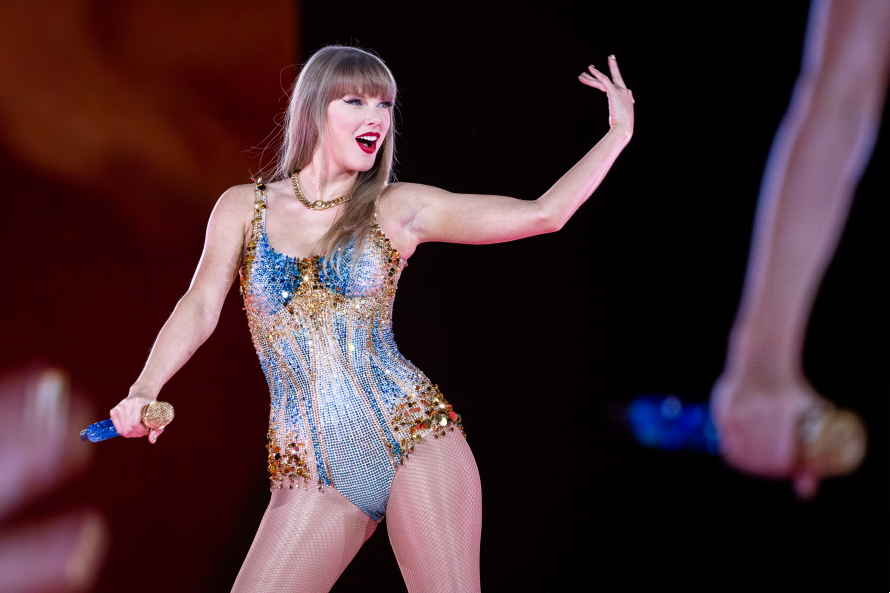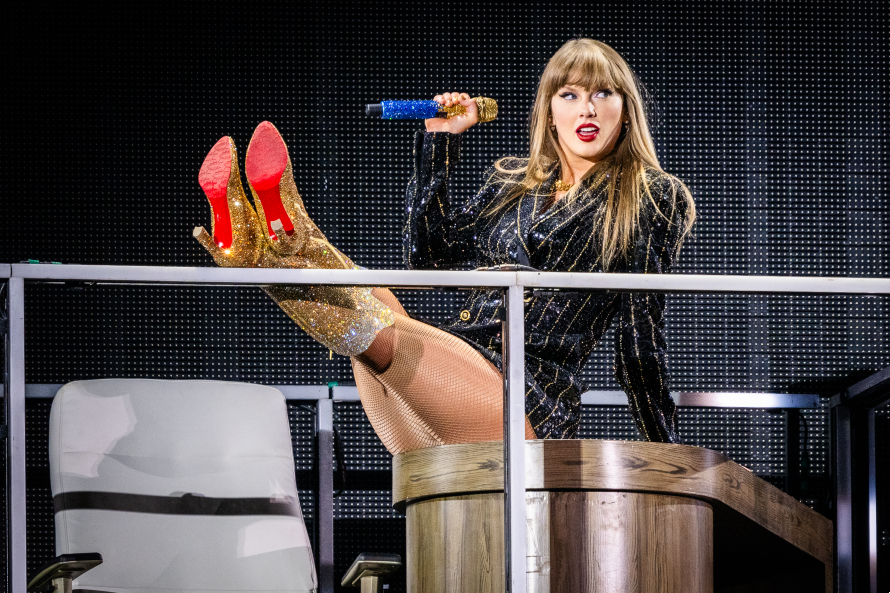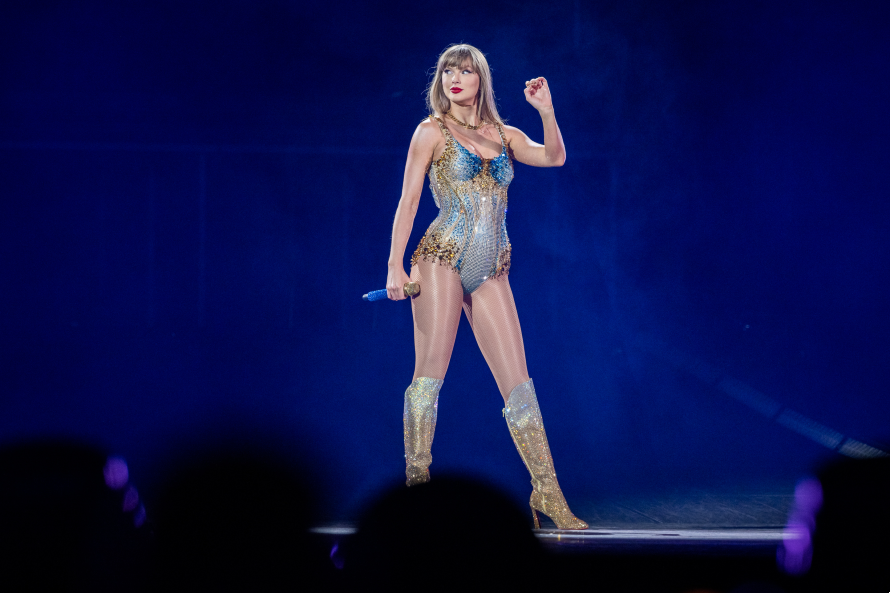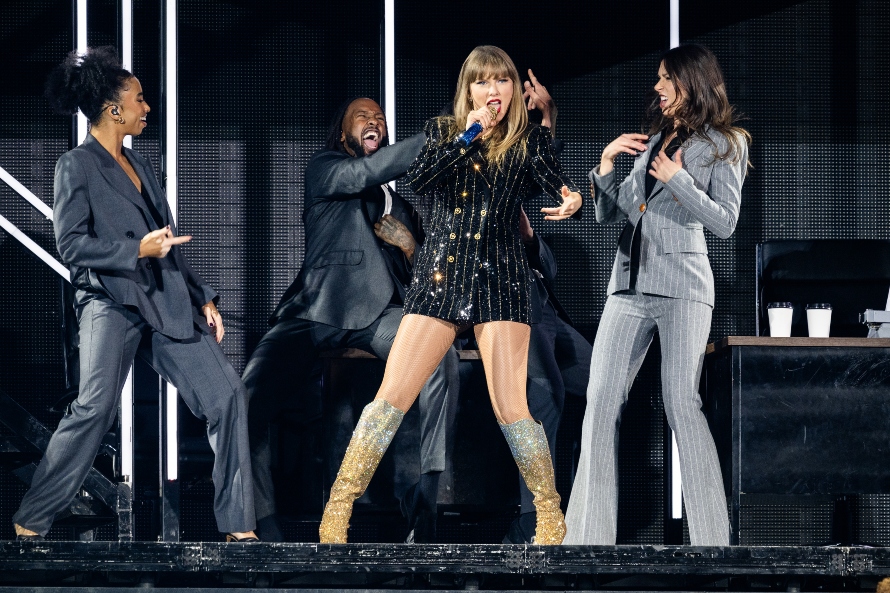"Is this gonna work?"
Taylor Swift asked this while soundlessly strumming an acoustic guitar, the crowd's tepid response indicating that, no, the volume wasn't on. For about five seconds, Swift glanced around looking a little lost, hoping an audio technician would fix the issue. Any musician who has played shows, big or small, has been in the same situation: shit, why isn't this thing working?
Of course, the volume was quickly turned on and Swift launched into a note-perfect version of "betty." But it was reassuring to see, just for a few seconds, a crack in the façade; a rough edge in a show that was triumphant, gloriously opulent, and occasionally a little cold.

Expecting raw spontaneity from any show of this scale is, of course, unrealistic. Swift has been on her Eras Tour for nearly two years, in which time it's become the highest-grossing tour ever put on by a mile. Every sidelong glance, every moment she paused to soak in the cheers, had been meticulously choreographed — and we know that because we already saw her do it in her Eras Tour concert film last year. As a songwriter, she knows her way around a metaphor, but her visual sensibilities are hyper-literal; every lyric including the word "time" found her pointing at an imaginary wristwatch; each time she sang the word "call," she would hold her hand up like a phone to her ear; lyrics about snow were greeted with puffs of white confetti. This is about spectacle, not surprises.
Unlike most concert reviews, we won't bother detailing the setlist (it was massive and career-spanning, duh), the lighting (it was a dazzling, Vegas-sized circus) or the outfits (a whole lotta sequins). If you care, you already know what the Eras Tour is like. Kudos to Swift for at least trying to personalize the experience in small ways: the backup dancer who chimed in with a very Canadian "Sorry aboot it" during "We Are Never Getting Back Together," or the customary surprise acoustic songs (we got a ghastly mashup of "My Boy Only Breaks His Favourite Toys" and "This Is Why We Can't Have Nice Things," and the sweetly yearning "'tis the damn season" with soul-inflected "False God").

Early on in the set, Swift spoke about the Eras Tours nearing its end, pointing out that what has made it special isn't the show itself, but how fans have bought into it. She's right. While some fanbases subscribe to that old, cynical adage of not wearing a band's T-shirt to their concert, Swifties treat her shows more like a sporting event: they dress up as their favourite era (all-red ensembles, hooded cloaks for the evermore folks, Aristotle for "So High School" fans, etc.) or in sparkly custom shirts.
Practically everyone had wrists full of friendship bracelets. Right behind us, three generations of women from the same family were enjoying the show together. Little kids were standing on their seats, hollering along with every word of the industrial-inspired banger "...Ready for It?" Toronto fan events like Choir! Choir! Choir!'s singalongs or the "Taylgate" party even catered to fans who might have not been able to afford the Eras Tour's ticket prices. This fan community is bigger than Taylor herself — and it was far more heartwarming to witness in-person than it is to be bullied on Twitter by dogmatic stans who are angry that Exclaim! didn't like The Tortured Poets Department.
Speaking of which, the very long show, which lasted over three hours, drops way off in its final couple of chapters. The bursts of fire that punctuated 1989's "Bad Blood" were a thrilling climax — despite the fact that the opportunity to do the funniest thing possible and bring Drake out to do Kendrick's verse was not taken — that came at least an hour before the end, as Swift back-loaded the show with the mid-tempo plodders of her two worst albums, The Tortured Poets Department and Midnights. After three hours with so many great songs ("Cruel Summer"! "All Too Well"! "august"!), attempting to sit through the overwrought "Who's Afraid of Little Old Me?" or the instantly forgettable "Midnight Rain" was a true endurance test for the crowd (when are we supposed to slip away to take a bathroom break?) and the performers; Swift's unbelievable stamina is a feat to witness, even if it may be falsely convincing some of the younger generation that their faves should all be putting on similarly marathon-style concerts.

But amidst this drawn-out anticlimax was one moment that stood out: "I Can Do It with a Broken Heart." It's a monotonous, bubblegum dance ditty that doesn't really allow for the emotional payoff you want from it, but that's perhaps the whole point: with this TTPD track, Swift puts the spectacle of the Eras Tour under scrutiny, revealing the pain hiding behind her pasted-on smile and how fan expectations feed into a toxic cycle of suppressing her true emotions. "All the pieces of me shatterеd as the crowd was chanting 'more,'" she sang, the Old Hollywood staging acknowledging the artifice of the feel-good performance.
In a joyful concert full of theatrical grins, with Swift gamely pretending to be surprised and delighted every time the crowd showered her with cheers, it was a fascinating moment to break the fourth wall, as the singer essentially admitted that the whole thing is fake. Coming close to the end of the night, it was hard not to think back on every moment in the show when Swift had gushed with delight, wondering what was really going on behind the sequins and the smile. Is everything that we've labelled "authentic" about her just a well-rehearsed act from a peerless professional?

Unquestionably, Taylor Swift is really good at the job of being a famous pop star — and with only eight more Eras Tour shows to go after this one, it remains to be seen if she will try to top it, or if she can find a way to finally slow her pace and drop her guard. We got such a moment of earnestness from opener Gracie Abrams, who was ecstatic to be there and poignantly expressed her own excitement for Swift's set: here we all are, emboldened to feel our feelings to the utmost degree, safe in a room full of equally passionate strangers.
Not only has Swift been what she's been to the fans that have grown up alongside her, but she's been this pillar to a generation of artists moulded in her image. The universality of Taylor Swift has surpassed the relatability of her songs (where the men she writes about are mainly foils for self-development) to include her coping skills, encouraging women especially to turn the hard parts of youth and beyond into art. Her problems may be champagne ones now, but her catalogue of diaristic emotional excavations — plus the real pain behind the imaginary lockdown tales of folklore and evermore — is there to remember it all.
